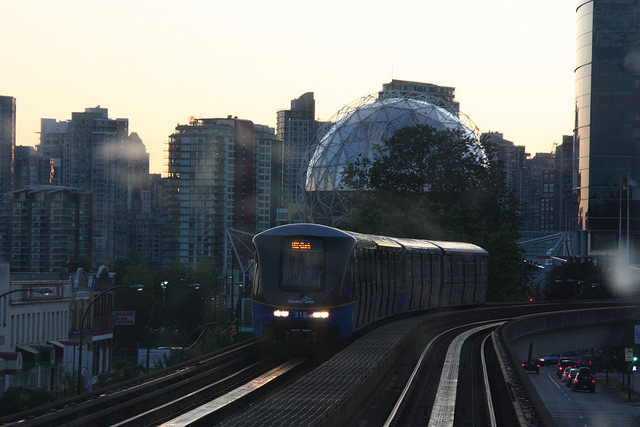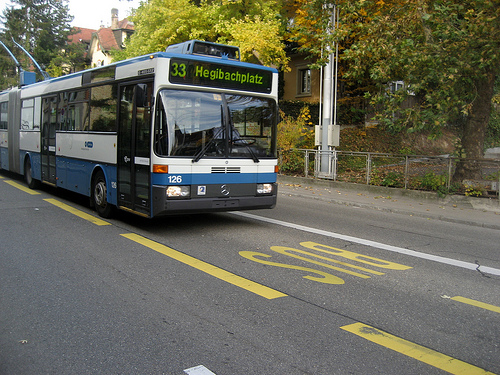Like this article? Chip in to keep stories like these coming.
![]()
The resounding No vote in the recent Metro Vancouver transit referendum leaves us in transit limbo. But looking at the history of transit referendums in Zurich, Switzerland provides an idea of what it may take to get us out of the present impasse.
In 1962, Zurich officials were shocked to have their subway and freeway plan resoundingly defeated in a referendum, and then perhaps even more shocked have a similar plan voted down by a bigger margin eleven years later. The Zurich region was clearly in a stalemate, with little prospect of getting support for their ambitious transportation plans as transit service slowed to a crawl in congestion and pollution worsened.
But after the 1973 oil shock and resulting economic disruption a much different plan was put to referendum in 1977. The plan broke radically from the previous plans by giving clear priority to public transit over the private automobile — something that probably would not have been politically feasible without the perception that continued dependence on oil was putting peoples’ futures at risk.
Surprisingly to many, the 1977 referendum passed by a healthy margin. And work started on creating an unprecedented network of exclusive transit lanes and signal priority for both streetcars and buses. At that time transit signal priority (traffic signals designed so that transit vehicles don’t have to stop at traffic lights) had to be invented from scratch. Now multiple manufacturers provide well proven transit priority systems. Every year the Zurich transit authority gets closer to its goal of never having transit passengers delayed by automobile traffic. Zurich showed that a great transit system can be created without expensive subways or elevated rapid transit. Zurich had the highest transit ridership in Europe, even before voters approved an expensive cross-town tunnel to improve connectivity for passengers on regional and long distance trains.
The fact that after the oil crisis Zurich voters were willing to vote for an unprecedented plan (including untested technology that some experts said would never work) is worth considering given the present climate and ocean acidification crisis. The 1973 oil embargo by Arab oil exporting countries and the resulting global recession was, in hindsight, a minor incident. But countries around the world took strong steps to reduce oil consumption; the most famous example may be the 1974 Emergency Highway Energy Conservation Act that reduced speed limits to 55 miles per hour (90km/h) across the U.S.
In comparison, the present climate crisis is exponentially more serious and long term. The extreme drought and wildfires seen across much of western Canada this year are just one hint of how bad things could get we don’t reduce carbon pollution quickly and deeply. The climate crisis is already here for the forest workers in B.C.’s interior who have been losing their livelihoods for years due to the pine beetle infestation, which is a direct result of the rapidly changing climate. Ocean acidification, caused by carbon dioxide pollution from burning fossil fuels, is already eating away at jobs and family businesses in B.C.’s shellfish industry. On the horizon is the multi-billion dollar bill for strengthening flood protection for Delta and Richmond B.C., which could be swallowed by rising sea levels regardless.

Globally, the people with the least financial wealth — who have done the least to cause the climate crisis — are the most vulnerable to the disastrous effects. As Pope Francis’ enormously influential encyclical points out “Many of the poor live in areas particularly affected by phenomena related to warming, and their means of subsistence are largely dependent on natural reserves and ecosystemic services such as agriculture, fishing and forestry. They have no other financial activities or resources which can enable them to adapt to climate change or to face natural disasters, and their access to social services and protection is very limited.” The poorest are the most vulnerable, but the whole of human society is threatened.
The climate crisis is unfolding around us, and we have already seen the dead forests and breathed the acrid smoke. Some of us have even lost our jobs or homes, or sent money to help family members rebuild or re-locate after climate fueled disasters in other parts of the world. But so far, most Canadians have not acting like we are in a crisis.
About a third of Canadian greenhouse gas (GHG) pollution comes directly from the transportation sector — from the tailpipes of cars, trucks and airplanes. When you add in the extracting and refining the fuel, building and maintaining roads, and building cars about half of Canada’s carbon footprint comes from transportation. A transformation of our transportation system is essential to prevent a global climate catastrophe, and Zurich’s 1977 plan illustrates how much can be accomplished quickly once a crisis is recognized.
The Metro Vancouver transit plan that was so soundly rejected did not inspire and mobilize even the minority who already recognize the climate crisis because it did not propose to reduce climate pollution, only stabilize it. In 1977, Zurich did the unprecedented and had to develop new technology. Now the technology of signal priority is well proven, and is an essential part of the light rail rapid transit lines planned for Surrey and Langley. Bus rapid transit — the combination of continuous bus lanes, signal priority, and all-door boarding — has been a neglected part of our regional transit plans for decades. We even have an electric trolley bus network that can be expanded to cover the whole region.
Metro Vancouver also has a decent start on a regional rapid transit network in place; and the proposed extension of the Millennium Line to connect with the Canada Line at Cambie can be compared to Zurich’s cross-town tunnel — a costly but worthwhile investment in regional transit connectivity.
After 1973, governments declared an energy crisis and acted decisively. But our governments seem unwilling to take climate pollution seriously, nevermind declaring a crisis. What is needed is a movement of ordinary people strong enough to declare a climate crisis and force decisive action, as Naomi Klein suggests in This Changes Everything. The funding for many more buses and other transit improvements is essential. But even more importantly, low-carbon public transit must be given priority on our public roads as Zurich did almost forty years ago in response to a much less serious crisis.
Eric Doherty is a Vancouver-based transportation planning consultant. Find him on Twitter @Eric_Doherty
Photo: flickr/ EURIST e.V.
Like this article? Chip in to keep stories like these coming.
![]()




